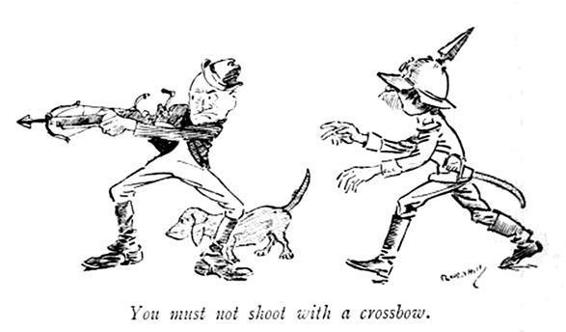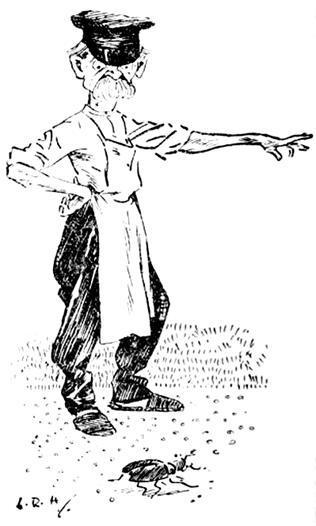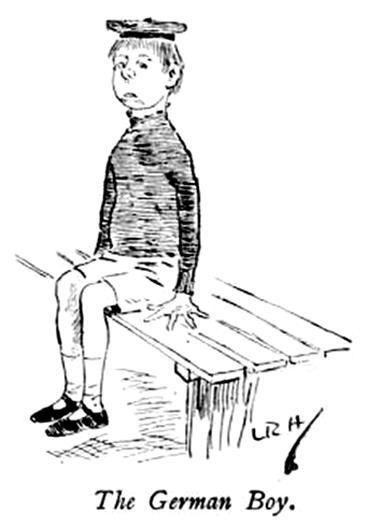Delphi Complete Works of Jerome K. Jerome (Illustrated) (Series Four) (48 page)
Read Delphi Complete Works of Jerome K. Jerome (Illustrated) (Series Four) Online
Authors: Jerome K. Jerome

In Germany you must not wear fancy dress in the streets. A Highlander of my acquaintance who came to pass the winter in Dresden spent the first few days of his residence there in arguing this question with the Saxon Government. They asked him what he was doing in those clothes. He was not an amiable man. He answered, he was wearing them. They asked him why he was wearing them. He replied, to keep himself warm. They told him frankly that they did not believe him, and sent him back to his lodgings in a closed landau. The personal testimony of the English Minister was necessary to assure the authorities that the Highland garb was the customary dress of many respectable, law-abiding British subjects. They accepted the statement, as diplomatically bound, but retain their private opinion to this day. The English tourist they have grown accustomed to; but a Leicestershire gentleman, invited to hunt with some German officers, on appearing outside his hotel, was promptly marched off, horse and all, to explain his frivolity at the police court.
Another thing you must not do in the streets of German towns is to feed horses, mules, or donkeys, whether your own or those belonging to other people. If a passion seizes you to feed somebody else’s horse, you must make an appointment with the animal, and the meal must take place in some properly authorised place. You must not break glass or china in the street, nor, in fact, in any public resort whatever; and if you do, you must pick up all the pieces. What you are to do with the pieces when you have gathered them together I cannot say. The only thing I know for certain is that you are not permitted to throw them anywhere, to leave them anywhere, or apparently to part with them in any way whatever. Presumably, you are expected to carry them about with you until you die, and then be buried with them; or, maybe, you are allowed to swallow them.
In German streets you must not shoot with a crossbow. The German law-maker does not content himself with the misdeeds of the average man — the crime one feels one wants to do, but must not: he worries himself imagining all the things a wandering maniac might do.

In Germany there is no law against a man standing on his head in the middle of the road; the idea has not occurred to them. One of these days a German statesman, visiting a circus and seeing acrobats, will reflect upon this omission. Then he will straightway set to work and frame a clause forbidding people from standing on their heads in the middle of the road, and fixing a fine. This is the charm of German law: misdemeanour in Germany has its fixed price. You are not kept awake all night, as in England, wondering whether you will get off with a caution, be fined forty shillings, or, catching the magistrate in an unhappy moment for yourself, get seven days. You know exactly what your fun is going to cost you. You can spread out your money on the table, open your Police Guide, and plan out your holiday to a fifty pfennig piece. For a really cheap evening, I would recommend walking on the wrong side of the pavement after being cautioned not to do so. I calculate that by choosing your district and keeping to the quiet side streets you could walk for a whole evening on the wrong side of the pavement at a cost of little over three marks.
In German towns you must not ramble about after dark “in droves.” I am not quite sure how many constitute a “drove,” and no official to whom I have spoken on this subject has felt himself competent to fix the exact number. I once put it to a German friend who was starting for the theatre with his wife, his mother-in-law, five children of his own, his sister and her
fiancé
, and two nieces, if he did not think he was running a risk under this by-law. He did not take my suggestion as a joke. He cast an eye over the group.
“Oh, I don’t think so,” he said; “you see, we are all one family.”
“The paragraph says nothing about its being a family drove or not,” I replied; “it simply says ‘drove.’ I do not mean it in any uncomplimentary sense, but, speaking etymologically, I am inclined personally to regard your collection as a ‘drove.’ Whether the police will take the same view or not remains to be seen. I am merely warning you.”
My friend himself was inclined to pooh-pooh my fears; but his wife thinking it better not to run any risk of having the party broken up by the police at the very beginning of the evening, they divided, arranging to come together again in the theatre lobby.
Another passion you must restrain in Germany is that prompting you to throw things out of window. Cats are no excuse. During the first week of my residence in Germany I was awakened incessantly by cats. One night I got mad. I collected a small arsenal — two or three pieces of coal, a few hard pears, a couple of candle ends, an odd egg I found on the kitchen table, an empty soda-water bottle, and a few articles of that sort, — and, opening the window, bombarded the spot from where the noise appeared to come. I do not suppose I hit anything; I never knew a man who did hit a cat, even when he could see it, except, maybe, by accident when aiming at something else. I have known crack shots, winners of Queen’s prizes — those sort of men, — shoot with shot-guns at cats fifty yards away, and never hit a hair. I have often thought that, instead of bull’s-eyes, running deer, and that rubbish, the really superior marksman would be he who could boast that he had shot the cat.
But, anyhow, they moved off; maybe the egg annoyed them. I had noticed when I picked it up that it did not look a good egg; and I went back to bed again, thinking the incident closed. Ten minutes afterwards there came a violent ringing of the electric bell. I tried to ignore it, but it was too persistent, and, putting on my dressing gown, I went down to the gate. A policeman was standing there. He had all the things I had been throwing out of the window in a little heap in front of him, all except the egg. He had evidently been collecting them. He said:
“Are these things yours?”
I said: “They were mine, but personally I have done with them. Anybody can have them — you can have them.”
He ignored my offer. He said:
“You threw these things out of window.”
“You are right,” I admitted; “I did.”
“Why did you throw them out of window?” he asked. A German policeman has his code of questions arranged for him; he never varies them, and he never omits one.
“I threw them out of the window at some cats,” I answered.
“What cats?” he asked.
It was the sort of question a German policeman would ask. I replied with as much sarcasm as I could put into my accent that I was ashamed to say I could not tell him what cats. I explained that, personally, they were strangers to me; but I offered, if the police would call all the cats in the district together, to come round and see if I could recognise them by their yaul.
The German policeman does not understand a joke, which is perhaps on the whole just as well, for I believe there is a heavy fine for joking with any German uniform; they call it “treating an official with contumely.” He merely replied that it was not the duty of the police to help me recognise the cats; their duty was merely to fine me for throwing things out of window.
I asked what a man was supposed to do in Germany when woke up night after night by cats, and he explained that I could lodge an information against the owner of the cat, when the police would proceed to caution him, and, if necessary, order the cat to be destroyed. Who was going to destroy the cat, and what the cat would be doing during the process, he did not explain.
I asked him how he proposed I should discover the owner of the cat. He thought for a while, and then suggested that I might follow it home. I did not feel inclined to argue with him any more after that; I should only have said things that would have made the matter worse. As it was, that night’s sport cost me twelve marks; and not a single one of the four German officials who interviewed me on the subject could see anything ridiculous in the proceedings from beginning to end.
But in Germany most human faults and follies sink into comparative insignificance beside the enormity of walking on the grass. Nowhere, and under no circumstances, may you at any time in Germany walk on the grass. Grass in Germany is quite a fetish. To put your foot on German grass would be as great a sacrilege as to dance a hornpipe on a Mohammedan’s praying-mat. The very dogs respect German grass; no German dog would dream of putting a paw on it. If you see a dog scampering across the grass in Germany, you may know for certain that it is the dog of some unholy foreigner. In England, when we want to keep dogs out of places, we put up wire netting, six feet high, supported by buttresses, and defended on the top by spikes. In Germany, they put a notice-board in the middle of the place, “Hunden verboten,” and a dog that has German blood in its veins looks at that notice-board and walks away. In a German park I have seen a gardener step gingerly with felt boots on to grass-plot, and removing therefrom a beetle, place it gravely but firmly on the gravel; which done, he stood sternly watching the beetle, to see that it did not try to get back on the grass; and the beetle, looking utterly ashamed of itself, walked hurriedly down the gutter, and turned up the path marked “Ausgang.”

In German parks separate roads are devoted to the different orders of the community, and no one person, at peril of liberty and fortune, may go upon another person’s road. There are special paths for “wheel-riders” and special paths for “foot-goers,” avenues for “horse-riders,” roads for people in light vehicles, and roads for people in heavy vehicles; ways for children and for “alone ladies.” That no particular route has yet been set aside for bald-headed men or “new women” has always struck me as an omission.
In the Grosse Garten in Dresden I once came across an old lady, standing, helpless and bewildered, in the centre of seven tracks. Each was guarded by a threatening notice, warning everybody off it but the person for whom it was intended.
“I am sorry to trouble you,” said the old lady, on learning I could speak English and read German, “but would you mind telling me what I am and where I have to go?”
I inspected her carefully. I came to the conclusion that she was a “grown-up” and a “foot-goer,” and pointed out her path. She looked at it, and seemed disappointed.
“But I don’t want to go down there,” she said; “mayn’t I go this way?”
“Great heavens, no, madam!” I replied. “That path is reserved for children.”
“But I wouldn’t do them any harm,” said the old lady, with a smile. She did not look the sort of old lady who would have done them any harm.
“Madam,” I replied, “if it rested with me, I would trust you down that path, though my own first-born were at the other end; but I can only inform you of the laws of this country. For you, a full-grown woman, to venture down that path is to go to certain fine, if not imprisonment. There is your path, marked plainly —
Nur für Fussgänger
, and if you will follow my advice, you will hasten down it; you are not allowed to stand here and hesitate.”
“It doesn’t lead a bit in the direction I want to go,” said the old lady.
“It leads in the direction you
ought
to want to go,” I replied, and we parted.
In the German parks there are special seats labelled, “Only for grown-ups” (
Nur für Erwachsene
), and the German small boy, anxious to sit down, and reading that notice, passes by, and hunts for a seat on which children are permitted to rest; and there he seats himself, careful not to touch the woodwork with his muddy boots. Imagine a seat in Regent’s or St. James’s Park labelled “Only for grown-ups!” Every child for five miles round would be trying to get on that seat, and hauling other children off who were on. As for any “grown-up,” he would never be able to get within half a mile of that seat for the crowd. The German small boy, who has accidentally sat down on such without noticing, rises with a start when his error is pointed out to him, and goes away with down-cast head, brushing to the roots of his hair with shame and regret.

